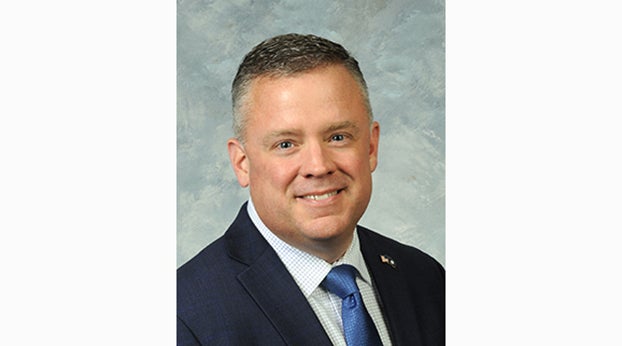Legislative update
Published 2:30 pm Friday, June 3, 2022

- State Rep. Matt Lockett
|
Getting your Trinity Audio player ready...
|
By Rep. Matt Lockett
39th Representative District
Without a doubt, our first responders have been through a lot over the past two years. Not only have they faced the stress of fighting on the front lines of a global pandemic, but they have also seen firsthand the impact of our drug addiction epidemic.
As a member of the Kentucky General Assembly, I want to be clear that we support our first responders. We stand with the paramedics, EMT’s and firefighters who rush to the scene of an emergency. Likewise, we reject calls to defund the police.
The General Assembly tackled several key issues during this year’s legislative session, but none of them took priority over helping Kentucky’s first responders. We approved legislation underscoring this commitment, from expanding resources for law enforcement and those on the frontlines to increasing pay for the Kentucky State Police. With this week’s update, I would like to share some details about the steps we took to support our first responders this session:
Clarifying Personnel Policies during Mandatory States of Emergency: HB 49 extends the existing practice of allowing eligible overtime attributable to a state of emergency to include overtime earned because of an emergency as declared by a local government when the Governor authorizes mobilization of the Kentucky National Guard.
Lifeliners Act: This important measure, HB 79, includes telecommunicators as eligible participants in the Law Enforcement Professional Development and Wellness Program in order to extend mental health resources.
Enrolling Officers in KLEPF: We approved HB 137 this session, which adds to the definition of a police officer to include joint task force members, county attorney investigators, process servers for juvenile courts, and commonwealth attorney’s investigators to make them eligible for the annual Kentucky Law Enforcement Foundation Program Fund supplement.
Peace Officer Certification: A bipartisan effort, HB 206 prevents those with a history of sexual assault from becoming a peace officer. This bill extends the prohibition to misdemeanors in the qualifications for becoming a peace officer. It ensures that those who are meant to protect the citizens have not been convicted of a sexual misconduct crime.
Raises for Kentucky State Police Troopers: This session the legislature passed HB 259, codifying the $15,000 raises for KSP troopers provided for in HB 1.
911 Next Generation Fund: We also shifted the portion of the funding from the Commercial Mobile Radio Service (CMRS) fund to the 911 Next Generation Fund. HB 363 to ensures that every dispatch center has the most up to date technology to support first-responders.
Eliminating Outdated Law Enforcement Recruitment Protocols: This measure addresses the ever-present retention issue faced by local and county law enforcement agencies. HB 414 removes the age limit for applicants, which currently requires that applicants be between 18 and 45 years old. Additionally, the measure includes enhanced provisions regarding formal complaints filed against an officer.
Protecting First Responders: HB 562 allows peace officers and firefighter’s 48-hours of optional leave after a critical event happens. This could provide the valuable time needed to process a traumatic event.
Training Delivery Options for DOCJT: This legislation allows the Kentucky Department of Criminal Justice Training to establish and maintain an online learning curriculum for specific classes within the Criminal Justice Training Program. The measure, HB 565, limits the use of remote learning to 10% of initial training and 30% of annual training, as well as prohibiting the use of remote learning when physical fitness is part of the training curriculum.
Expanded Counseling Services for Public Safety Personnel: SB 64 permits the creation of peer counseling groups in local fire and police departments. The programs fall under established departmental protocols and the content of the meetings shall be confidential unless the conversations relate to an employee’s announced intent to commit suicide, the admission of a violent crime against a minor child or senior adult, or the intent to carry out a dangerous act against another individual.
Benefits for First Responders Who Continue to Work Beyond Retirement: We worked with the Kentucky Senate to establish vacation, sick leave and holiday pay policies for retired troopers and commercial motor vehicle enforcement officers who choose to work beyond their retirement. SB 209 also clarifies that hazardous duty employees who work beyond the required 20 years shall earn an additional $5 per month per additional year worked to be applied to their health insurance premium upon retirement. In addition, nonhazardous employees will earn $5 for every year worked beyond 27 years.
A hero goes above and beyond the call of duty. To me, everyone who has served their community through these unprecedented times is a hero. Words cannot express my appreciation for our brave law enforcement officers and first responders. We must never forget the sacrifices each of these men and women, as well as their families, make every day to protect our neighborhoods and communities.
By-and-Large, we have seen workforce participation rates drop. This is especially prevalent in our law enforcement. While we are proud to support all of our heroes, I believe it is worth taking a look at what we have done to assist one of the sectors in our law enforcement that often goes without recognition; the Kentucky State Police.
The Kentucky State Police (KSP) legacy is a rich one. The agency has been around since 1948 when the Kentucky General Assembly passed the State Police Act to create a statewide police force with authority in all 120 counties. Until then, the state’s premier law enforcement agency was the Kentucky Highway Patrol, which since 1936 had focused primarily on traffic safety enforcement. The KSP is technically an agency within the Justice and Public Safety Cabinet.
The KSP has evolved to include not only the traditional law enforcement responsibilities in the decades since its inception, but also the state’s forensic crime lab, sex offender registry, commercial vehicle enforcement, driver’s testing, criminal background checks, among many other responsibilities. Dubbed the “Thin Gray Line” because of the traditional French gray of their uniform, those interested in becoming a Trooper must complete a rigorous 24-week training program. The program ranges from crisis aversion tactics to accident reconstruction.
Like many necessary state functions, the KSP went thankless for quite some time as state resources have gone to functions like Medicaid and public pensions. That ended this year as I joined other legislators in making KSP a priority in our state budget. While staffing numbers for the agency are at an all-time low, these investments should help with both recruitment and retaining current officers.
Currently, Kentucky ranks among the bottom percentile in average pay. In fact, KSP starting pay ranks 74th when compared to local law enforcement agencies and at the very bottom when compared to state police agencies in surrounding states. HB 1, the executive branch budget bill, funded a $15,000 raise for Kentucky State Troopers as well as motor vehicle inspectors. We codified that raise in HB 259 and it is set to take effect July 1 of this year. With the salary increase we approved, compensation will improve in national rankings and give us access to a larger pool of applicants, in turn helping us cover more ground and effectively staffing post positions that are currently neglected.
In addition to raises, several other budgetary items were passed within HB 1 that grant the agency the tools it needs for trooper retention and updates to its infrastructure, which include:
• $215,000,000 in fiscal year 2021-2022 to be applied to the unfunded pension liability, to reduce the employer contribution rates from 141% to 100%.
• $7,462,100 in fiscal year 2022-2023 to fund the costs associated with converting sick leave to service credit upon an employee’s retirement.
• $9,759,200 in fiscal year 2022-2023 for body camera surveillance technology.
• $951,000 in fiscal year 2022-2023 for the purchase of laboratory equipment, including but not limited to firearm imaging systems, DNA collections systems, and microscopes.
I hope it goes without saying that the Kentucky General Assembly rejects the idea of defunding the police and instead doubled down on our support of the Kentucky State Police. These men and women protect and serve our Commonwealth, making Kentuckians far safer from Paducah to Pikeville and all points in between. I am extremely hopeful that the work we did during the 2022 legislative session not only sends a clear message that we stand with them, but also that it is the first in a renewed commitment to providing for those who serve us.
As I wrap up this weeks Legislative Update, I would be remiss if I did not take a moment to reflect on the legacy of Jessamine County Sheriff Kevin Corman.
Sheriff Corman was a class-act, and was what I consider a prime example of the excellence in our local law enforcement. My thoughts, best wishes, and prayers go out to not only his family, but our community as we grieve the loss of a great sheriff, husband, friend, and colleague.
I hope to continue these updates on the work we did this session over the weeks to come so please keep reading. In the meantime, I can be reached here at home anytime, or through the toll-free message line in Frankfort at 1-800-372-7181. If you would like more information, e-mail me at Matt.Lockett@lrc.ky.gov or visit the legislature’s website www.legislature.ky.gov.




